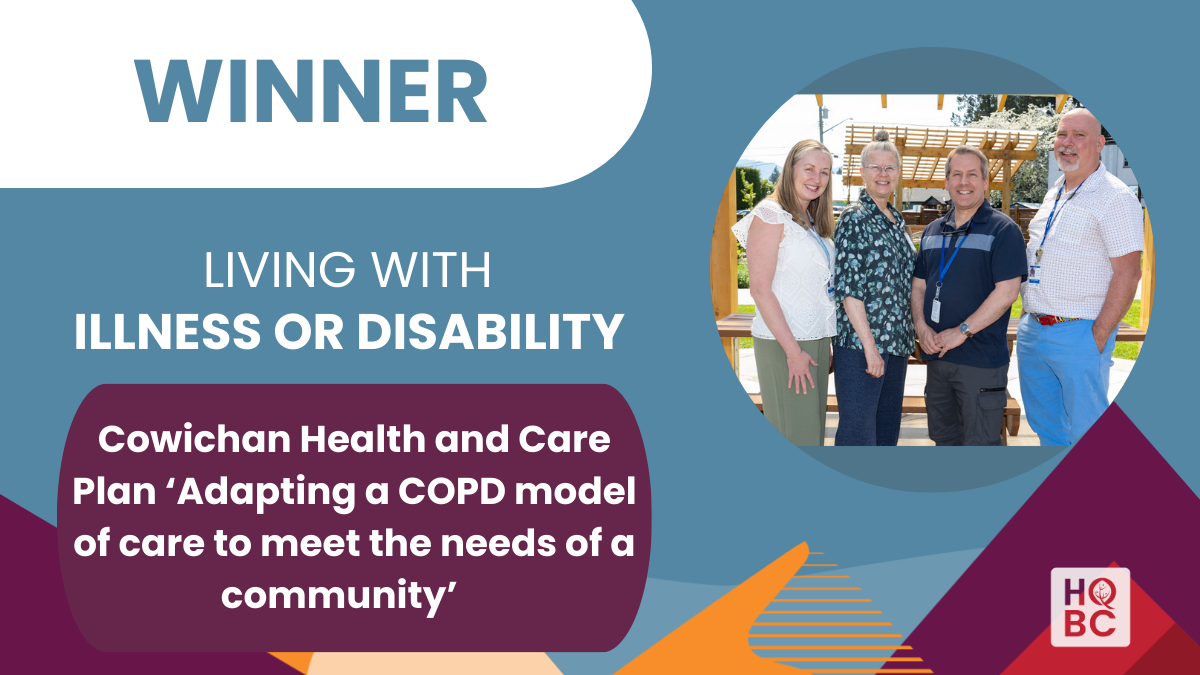- 2025
|
- Winner
|
- Living with Illness or Disability
Following a state of chronic overcapacity at the local regional hospital, and in preparation for the opening of a new hospital for the Cowichan area, Island Health spearheaded the development of a health-systems transformation initiative to improve the health and care of a community, and subsequently reduce the need for hospitalization. By reviewing area-level population health needs, identifying the top users of acute care, and actively engaging communities to understand community-specific needs, an asset-based roadmap was co-created to guide the strategic investment of resources over time: the Cowichan Health and Care Plan (CHCP). One of the first strategies implemented by the CHCP was the interdisciplinary Chronic Obstructive Pulmonary Disease (COPD) outreach program, to address the needs of people in the area living with COPD.
The Cowichan Valley has one of the highest rates of COPD across both Vancouver Island and BC and the CHCP identified COPD as one of the top reasons of hospital admission, and it was deemed a priority population.
The lack of specialized COPD services in the Cowichan Valley was identified as an opportunity for improvement in care. COPD is considered an ambulatory condition, which is defined as “a chronic medical condition that leads to potentially preventable hospitalizations when not treated effectively in the outpatient setting.” As such, rates of COPD-related hospital admissions can be viewed as an indicator of quality of outpatient care). In response, CHCP established the interdisciplinary COPD outreach program in 2021. The interdisciplinary COPD outreach team consists of a respiratory therapist, a clinical pharmacist, nursing support and behavioural health clinicians. The team provides clients with holistic wraparound COPD care and support including assessments, medication optimization, COPD education, pulmonary rehabilitation, rapid response, and psychosocial support. The program also empowers clients with tools to self-manage their COPD exacerbations through education and COPD action plans. In addition, the COPD team initiated in-person COPD educational sessions where clients and their family members could come together to learn about COPD and connect with others living with COPD.
The Cowichan COPD program was derived from best practice literature and an evidence-based model of care. However, following the pandemic, human resource constraints, challenges accessing primary care and a higher complexity of clients made translating evidence into practice challenging. The COPD team recognized early on the need to pivot from program specifics and initial operational planning to address the changing health care landscape. By leveraging existing resources, adopting a learning health system approach incorporating real-time monitoring and evaluation to guide continuous improvement, and ensuring agency and engagement remain foundational to quality improvement, the COPD team co-created solutions to adapt to local context and real-world settings. They were able to successfully adapt the care model to meet changing client needs, staffing challenges and navigate health system complexities, ensuring a patient-centered model of care.
Physicians across the Cowichan Valley are seeing the impact of the COPD program on their day-to-day practice. Dr. Stacey McDonald, a family physician from Ladysmith Family Practice, has a fairly large number of patients with COPD and regularly refers to the COPD program. She stated that she now finds her patients are more confident in self management of their COPD and are using their inhalers appropriately. She is also seeing fewer calls from patients with COPD requesting urgent appointments, as well as fewer urgent care and emergency department visits for COPD exacerbations. “Patients are more confident to manage of their (COPD) flare up.… I generally feel my COPD patients are better managed.”
The COPD program has supported clients in taking ownership of their health and has had a positive impact on quality of life. One client was referred to the program after being hospitalized for COPD. The team optimized her COPD medications and provided her with self-management tools and education. She stated that before she had no idea what to do but, now if she has a flare up, she knows what it is and how to deal with it. “It gave me the power to look after my own health. I think everybody that gets diagnosed with COPD should go through that program. It can save so many lives.”
To date, the COPD team has provided care for over 750 clients, putting clients at the center of their own care, and helping them gain a deeper understanding of individual goals and best support what matters most to clients and their families.


